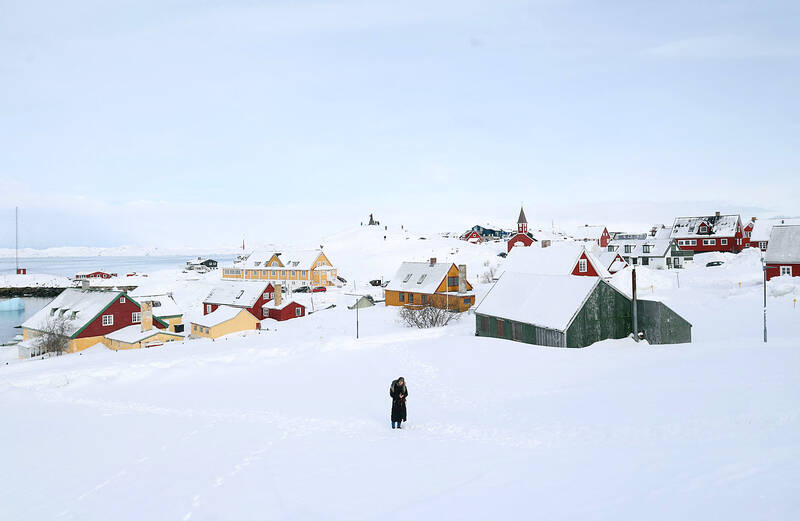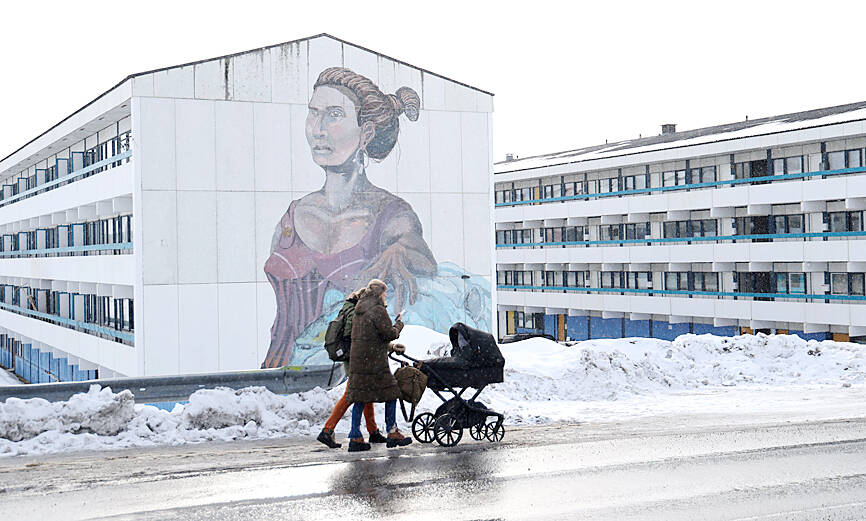Greenland, which US President Donald Trump wants to annex on grounds of US national and international security, is a self-governing Danish territory in the arctic covered in ice, with untapped mineral resources and geostrategic importance.
“We have to have it,” Trump said on Wednesday, ahead of Vice President JD Vance’s visit yesterday to the US Pituffik Space Base on Greenland’s northwestern coast.
Greenland is an autonomous territory, but remains dependent on Copenhagen for law enforcement, monetary policy, foreign affairs, defense and security policy.

Photo: Reuters
However, with its capital closer to New York than Copenhagen, Greenland is in the US’ “zone of interest,” said Astrid Andersen, senior researcher at the Danish Institute of International Studies.
“During the war, while Denmark was occupied by Germany, the US took over Greenland. In a sense they have never left,” she said.
The US has its active military base there, used during the Cold War as a warning post for possible attacks from the Soviet Union and still an essential part of the US’ missile defense infrastructure.

Photo: Reuters
Greenland’s location puts it on the shortest route for missiles between Russia and the US.
Washington has “legitimate complaints about the lack of surveillance of the airspace and submarine areas east of Greenland,” said Ulrik Pram Gad, also a senior researcher at the Danish Institute of International Studies.
Its strategic position is gaining in importance as melting ice opens new shipping lanes, but Trump is using “exaggerated terms,” Pram Gad said
Trump in 2019, during his first term in office, floated the idea of a US purchase of Greenland, but that was rebuffed.
Since 2009, Greenlanders have held the authority of deciding how their natural resources are used.
Access to Greenland’s mineral resources is considered crucial by the US, which signed a memorandum on cooperation in the sector in 2019. The EU followed suit four years later with its own agreement.
Greenland’s soil is well-explored, which has enabled a detailed map of resources to be drawn up. The EU has identified 25 of the 34 minerals on its official list of critical raw materials in Greenland, including rare earths.
“As the demand for minerals is rising, there is a need to go and look for untapped resources,” said Ditte Brasso Sorensen, a senior analyst at Think Tank Europa.
“Actors are more and more aware they need to diversify their sources, especially when it comes to the dependence to China on rare earth elements,” Sorensen said.
Adding to this is the fear that China would get its hands on the mineral resources, she said.
Yet the mining sector in Greenland is largely non-existent. There are only two mines on the island — one for rubies, which is looking for new investors, and the other for anorthosite, a rock containing titanium.
Economically, the territory depends on annual subsidies from Copenhagen — which account for one-fifth of its GDP — and on fishing.
Hopes are in part pinned on the opening of an international airport in Nuuk in November to help develop tourism in the arctic region.
Infrastructure is also a key issue for the development of the mining industry.
“When it comes to extractive industries, Trump is putting Greenland on the mining map in discourse, but it’s hard to say how it could evolve as there is a lack of investors,” said Lill Rastad Bjorst, an associate professor at Aalborg University specializing in Greenland.
Sorensen said there are inherent difficulties of such endeavors in Greenland, with its “very harsh weather conditions, a protected environment and lots of costs with the need to develop the physical and digital infrastructure.”
Public opposition to uranium mining in southern Greenland prompted legislation banning the extraction of radioactive products. Another potential resource to be exploited is oil, but it is at a standstill.
“The government of Greenland has paused their commitment to oil exploration in Greenland and sees a great potential in hydropower,” Rastad Bjorst said.

‘HYANGDO’: A South Korean lawmaker said there was no credible evidence to support rumors that Kim Jong-un has a son with a disability or who is studying abroad South Korea’s spy agency yesterday said that North Korean leader Kim Jong-un’s daughter, Kim Ju-ae, who last week accompanied him on a high-profile visit to Beijing, is understood to be his recognized successor. The teenager drew global attention when she made her first official overseas trip with her father, as he met with Chinese President Xi Jinping (習近平) and Russian President Vladimir Putin. Analysts have long seen her as Kim’s likely successor, although some have suggested she has an older brother who is being secretly groomed as the next leader. The South Korean National Intelligence Service (NIS) “assesses that she [Kim Ju-ae]

In the week before his fatal shooting, right-wing US political activist Charlie Kirk cheered the boom of conservative young men in South Korea and warned about a “globalist menace” in Tokyo on his first speaking tour of Asia. Kirk, 31, who helped amplify US President Donald Trump’s agenda to young voters with often inflammatory rhetoric focused on issues such as gender and immigration, was shot in the neck on Wednesday at a speaking event at a Utah university. In Seoul on Friday last week, he spoke about how he “brought Trump to victory,” while addressing Build Up Korea 2025, a conservative conference

DEADLOCK: Putin has vowed to continue fighting unless Ukraine cedes more land, while talks have been paused with no immediate results expected, the Kremlin said Russia on Friday said that peace talks with Kyiv were on “pause” as Ukrainian President Volodymyr Zelenskiy warned that Russian President Vladimir Putin still wanted to capture the whole of Ukraine. Meanwhile, US President Donald Trump said that he was running out of patience with Putin, and the NATO alliance said it would bolster its eastern front after Russian drones were shot down in Polish airspace this week. The latest blow to faltering diplomacy came as Russia’s army staged major military drills with its key ally Belarus. Despite Trump forcing the warring sides to hold direct talks and hosting Putin in Alaska, there

North Korea has executed people for watching or distributing foreign television shows, including popular South Korean dramas, as part of an intensifying crackdown on personal freedoms, a UN human rights report said on Friday. Surveillance has grown more pervasive since 2014 with the help of new technologies, while punishments have become harsher — including the introduction of the death penalty for offences such as sharing foreign TV dramas, the report said. The curbs make North Korea the most restrictive country in the world, said the 14-page UN report, which was based on interviews with more than 300 witnesses and victims who had